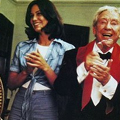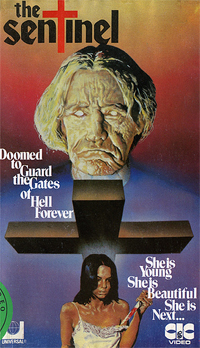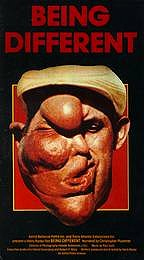 I never really thought about this before, but I think maybe there’s such a thing as Upper Class Horror. Alot of the horror movies are about the middle class, kids from the suburbs, babysitters, etc. The kids in TEXAS CHAIN SAW MASSACRE driving around in that van probly don’t have a ton of money. And you got some working class horror here and there, some of the Romero movies, or different ones about cops or whatever. In PSYCHO you have a secretary desperate for money and a guy running a dying motel business. DON’T GO IN THE HOUSE the guy incinerates trash for a living.
I never really thought about this before, but I think maybe there’s such a thing as Upper Class Horror. Alot of the horror movies are about the middle class, kids from the suburbs, babysitters, etc. The kids in TEXAS CHAIN SAW MASSACRE driving around in that van probly don’t have a ton of money. And you got some working class horror here and there, some of the Romero movies, or different ones about cops or whatever. In PSYCHO you have a secretary desperate for money and a guy running a dying motel business. DON’T GO IN THE HOUSE the guy incinerates trash for a living.
But Upper Class Horror would be the ones about professors and celebrities and what not. THE EXORCIST, DON’T LOOK BACK, THE SENTINEL, these are movies about people with money. The men wear suits and ties. The heroines don’t have to get up and go to work every day. When they think they’re going crazy they have the luxury of just worrying about getting better, not about how they’re gonna pay the medical bills. They have the best doctors.

Sometimes they’re famous. In THE EXORCIST Ellen Burstyn’s character is a movie actress. In THE SENTINEL our heroine Alison (Cristina Raines) is a model who sometimes gets recognized for her shampoo commercial. Their lives are modern but they find themselves confronting ancient religious secrets and people who died in the past. The middle class tends to be attacked by random psychopaths wandering around their neighborhoods (or whose neighborhoods they wandered into). These people live in old buildings with metal gates in front, so they can only really be threatened by ancient supernatural forces.
They look for help from the Catholic church. Why call a cop when you can call a priest? They try to go on with their lives, enjoying themselves at cocktail mixers, but health problems caused by ancient evil will interfere. In this case she gets real dizzy. Because of a portal to hell, I believe.
Allison is looking for a new apartment. She could just marry her rich lawyer boyfriend (Chris Sarandon, with mustache) but she’s not ready yet. She finds a good deal on a place in the aforementioned old gated building and she takes it. Right away she starts meeting the neighbors. An old goofball introduces his bird and cat, an older lesbian couple freaks her out when one of them rubs her crotch right in front of her. She gets invited to the cat’s birthday party.
But don’t worry, she won’t have to learn to live with all these weirdos, because the next day she learns that none of them exist. The building is empty except for her and the one blind priest upstairs. Just a little misunderstanding I guess. You know how it is: I went to a birthday party for a cat. No you didn’t. Oh, whoops, my mistake.
Things keep getting stranger, she has fainting spells, she sees weird things, things that other people don’t see, like Latin in books that don’t have Latin in them. There’s an unusual structure where the movie is from her perspective but then about an hour in she’s sick and laying around and it switches to her sleazy lawyer boyfriend investigating what’s going on using his connections (both legal and otherwise) to get access to the other apartments in the building, to the church files, etc. Before that the guy seemed like a prick (and is) but you have to like him better when he believes her and throws himself into this problem.
I guess these upper class/religious/supernatural stories aren’t my favorite type of horror, but this one is pretty good and unique enough to respect. If I may interpret this thing I think Allison has an unhealthy fear of old people’s sexuality. As if the in-your-face lesbians weren’t enough of a sign there’s a flashback to a traumatic time in her past (or hallucination?) where she walks in on her corpse-like father rolling around in bed with two naked women, and they’re feeding cake to each other. That’s a good touch man, so non-perverted, but so decadent, that it just makes it ten times more gross. Nobody wants to think of their parents having sex, but what about their dad fucking two women and they’re feeding cake to each other? Isn’t that worse? Allison is so freaked out she runs to another room and immediately slits her wrists.
Every once in a while there’s a really crazy image like that that you haven’t seen in a movie before, and that makes it worth your time. Another highlight is when her dead father seems to be in front of her and she freaks out and slices off his nose. In general there are not enough nose-severings in horror, but that’s no fault of THE SENTINEL. THE SENTINEL is doing its part.
 Then at the end there’s a bunch of people that are supposed to be minions of Hell, and if you ever patronized video stores in the 1980s you can’t help but notice the dude from the cover of that old video BEING DIFFERENT. Yes, there are actual “freaks” appearing in the movie. The point of BEING DIFFERENT was to honor the people who have managed to live life despite the tremendous challenges and stigma of being born severely deformed. So this movie casts several of them as demons from Hell. It’s the kind of class act we’ve come to expect from sometimes great, often befuddling director Michael Winner (DEATH WISH 1-3). I’m not sure if it’s just a way to not have to spend a bunch of money on makeup or if it’s saying that these poor bastards are all going to Hell. Man, what did they ever do?
Then at the end there’s a bunch of people that are supposed to be minions of Hell, and if you ever patronized video stores in the 1980s you can’t help but notice the dude from the cover of that old video BEING DIFFERENT. Yes, there are actual “freaks” appearing in the movie. The point of BEING DIFFERENT was to honor the people who have managed to live life despite the tremendous challenges and stigma of being born severely deformed. So this movie casts several of them as demons from Hell. It’s the kind of class act we’ve come to expect from sometimes great, often befuddling director Michael Winner (DEATH WISH 1-3). I’m not sure if it’s just a way to not have to spend a bunch of money on makeup or if it’s saying that these poor bastards are all going to Hell. Man, what did they ever do?
Those aren’t the only recognizable faces in the cast either. There’s Martin Balsam (Arbogast from PSYCHO), John Carradine, Ava Gardner, Burgess Meredith, Sylvia Miles, Eli Wallach, Beverly D’Angelo, even Jerry Orbach (OUT FOR JUSTICE). DEATH WISH rapist Jeff Goldblum shows up a couple times as a hip photographer, Christopher Walken as a detective, and Tom Berenger has a bit part in the very last scene.
Raines is convincing as a model because she’s gorgeous. She’s also a likable and fairly capable heroine, at least until she gets sick and tired and somehow they really pull off the trick of shifting your interest to the douchebag boyfriend. I didn’t see that coming.
I didn’t exactly know what the ending was gonna be either, although if I would’ve seen any of the movie posters I would’ve. Great job, marketing people.
The script is by Jeffrey Konvitz, based on his novel. Writing it may have gotten him cursed. He went on to produce CYBORG 2, BLOODSPORT 2, SPY HARD and 2001: A SPACE TRAVESTY. But whatever. He can always be proud of this weird fuckin movie.


























October 20th, 2010 at 4:05 am
You make an interesting point about the class thing Vern. I’ve always said that I’d like to see a really good horror movie based in (and credibly portraying) a working-class neighbourhood.
“Candyman” is the only one I can think of offhand that does it really well; but there it’s more urban ghetto than the kind of place I grew up in, and the protagonist is a middle-class white female reporter. “The Tournament” is set in the kind of place that used to be my old hunting grounds, but instead of using it effectively it decided to be a second-rate Terminator / T2 ripoff (and succeeded admirably), plus it’s not really a horror movie.
That just leaves “My Bloody Valentine” and remake. The trouble is that “MBV” was pretty awful, but still shone in comparison to the remake, which was somehow so bad that it made me look upon the original with nostalgia; and neither came close to portraying a mining town with any kind of accuracy. I grew up in one – the place in Wales I come from is famous for its mining towns – and while “My Bloody Valentine” gets the look superficially right, neither film captures the “feel”.
I haven’t seen “The Sentinel”, although I’ve wanted to for some time – it’s an interesting concept, that’s for certain. I’ll check it out. In the meantime, examples of good working-class horror films guys. Any ideas?